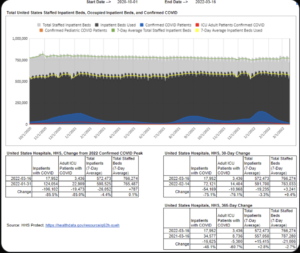Barry Brownstein warns of the dangers of the administrative state. A slice (with link added):
Administrative mandates and rules are unconstitutional. “Through administrative power,” [Philip] Hamburger argues, there now exists a third but “unconstitutional” way by which the “the executive purports to create legal obligation.” Administrative lawmaking is not justified as “delegated power.” Congress has no power to subdelegate its responsibilities to bureaucratic administrators. In short, administrative power, Hamburger writes, is “the very sort of power that constitutions were expected to prevent.” He warns that power wielded through government bureaucracies “binds Americans and deprives them of their liberty.”
Many citizens yield to administrative power believing we need experts, such as Fauci, to guide us. Hamburger cautions, “A person with specialized expertise will tend to overestimate the importance of that area and underestimate the significance of others. As a result, although experts can be valuable for their specialized knowledge, they cannot be usually relied upon for decisions that take a balanced view of the consequences.”
Hamburger was writing before COVID. Clearly, of the administrative agencies and bureaucrats threatening our liberties today, Dr. Fauci has led the charge. Fauci is arguably one of the most powerful unelected officials in American history.
On the one hand there is the Swiss chees model, which justifies almost any intervention (like plexiglass) on the basis of even low quality evidence. On the other hand there is evidence based medicine, which demands the highest quality evidence. Public health chose Swiss cheese.
Like [Rachel] Fulton Brown and his GMU colleague, Todd Zywicki, Boudreaux was ready to take his university to court. “I was all prepared to be a plaintiff to resist the booster mandate,” he said.
A lawyer with the NCLA had offered to represent him, Boudreaux stated.
However, before Boudreaux’s case could be brought to court, the issue became moot.
A divergence in policy: GMU reluctantly inches closer to normal while UChicago stays the course
The reason Boudreaux’s legal case became moot was because newly elected Virginia governor Glenn Youngkin signed an executive order prohibiting Covid vaccine requirements for state employees.
Shortly thereafter, Virginia attorney general, Jason S. Miyares, issued a non-binding opinion stating, “Public institutions of higher education in Virginia may not require vaccination against Covid-19 as a general condition of students’ enrollment or in-person attendance.”
Although nonbinding, it did effectively nullify the opinion of the previous attorney general, Mark R. Herring, which was supportive of such mandates. Hence it was sufficient to get several state universities in Virginia, including GMU, to rescind vaccine requirements for students.
Whatever GMU officials actually believed about the science backing their mandates and vaccines being “the most effective tools to combat COVID-19”, it would appear the politics of state leadership superseded all else.
Rachel Walensky confirmed as early as July 2021 that the vaccines did not prevent infection or transmission, yet colleges and universities continue to use the falsehood that student vaccination protects the vulnerable and prevents community spread.
As early as August 5, 2021, Dartmouth College reported a “sudden rise in cases” (Delta) in “fully vaccinated students and employees,” confirming that vaccination did not offer community protection. Cornell had a surge of more than 900 cases (Omicron) in their nearly fully vaccinated student population in December. These two examples are not outliers.
In short, vaccination does not prevent community outbreak, even on campuses with greater than 95% vaccination rates. The argument that students must take the vaccine to protect others is invalid.
What about protecting otherwise healthy individual students? It turns out that this population has an extremely low risk of serious illness from Covid-19, and a near-zero risk of death, even if unvaccinated.
“Did flawed PCR tests convince us Covid was worse than it really was?” (HT el gato malo)
Beware, fellow Americans: Fauci endorses the possibility of potentially severe “mitigation” measures against a new strain of Covid. (HT Phil Magness)
Here’s the abstract of David Campbell’s and Kevin Dowd’s new paper on Covid policy:
The ‘lockdown’ policy adopted in response to an outbreak of SARS-CoV-2 has been the worst example of government failure in peacetime history. Justified by the perceived grave emergency, lockdown was based on epidemiological and medical advice at the heart of which was a Report by the Imperial College Covid-19 Response Team. This Report predicted 510,000 deaths on the basis of absurd assumptions about a zero probability event and advocated a ‘suppression’ policy the empirical possibility of implementing which was never remotely adequately assessed. But though it had consequences of a quantitatively different order to other government failures, lockdown was qualitatively merely an example of the common form of such failures. The work of assessing empirical possibility is rarely adequately addressed, and difficulties of implementation are dismissed by what will be called the ‘ceteris paribus reasoning’ which follows from, as the Report makes particularly clear, an inchoately communist belief in political will.
And here’s another passages from the paper (page 8, footnote 32) – a passage that makes a point as subtle as it is important; it’s a point that applies not only to the U.K. yet one that was ignored by most governments and lockdown proponents:
For lockdown to be plausible, the UK spread of known and reasonably suspected infection had to be sufficient to make only targeting identified cases alone fruitless and to justify action at the level of the entire population. On the other hand, the spread had to be insufficient to make lockdown pointless because the contact rate was unmanageable or unnecessary because the herd immunity threshold had been exceeded.
Phil Kerpen has been doing some research, some of which is nicely summarized in this screenshot from his Twitter feed. (HT Jay Bhattacharya)




